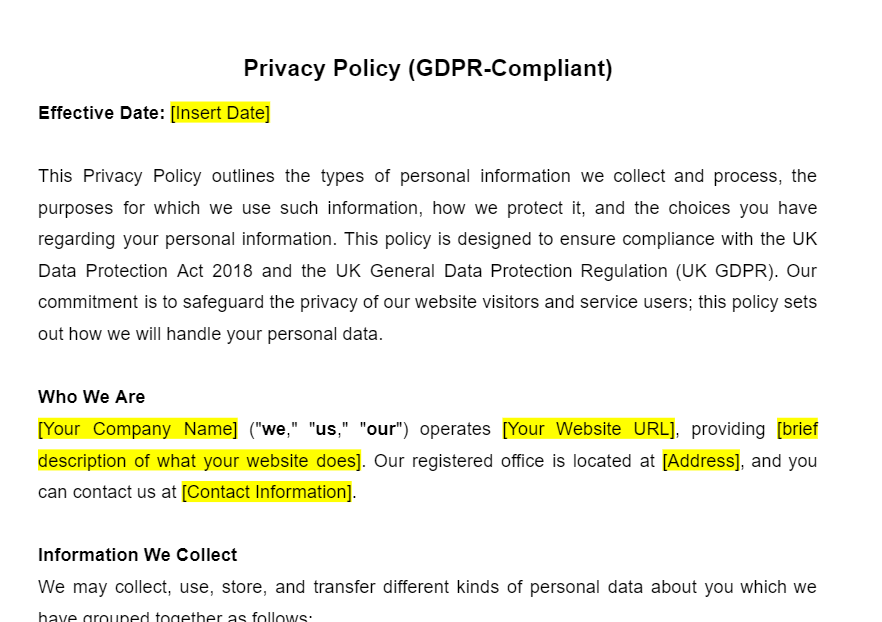
UK Website Privacy Policy Template
15 Downloads
Commercial, Corporate, IT and Media
November 27, 2024
Sayantani Dutta
Privacy has become a big deal over the years. The internet is littered with code that can track and identify you, and that data can be sold to third-party advertisers, for example. It’s only natural that in a climate like this, we prioritise our privacy when interacting with websites, applications, and tools online. As such, having a rock-solid privacy policy that tells readers what you collect and how you process it is not only ethically required, but legally as well. The UK’s approach to data protection and privacy differs from other parts of the world. So, just about any boilerplate privacy policy isn’t going to cut it.
In this article, we are going to talk about a good UK website privacy policy—what it needs, how to write a good one, and how to gain access to UK-specific privacy policy templates that you can customise with your details!
Privacy Laws in the UK
Let’s first talk about what must be included in a website privacy policy in the UK as per the law. The UK’s privacy laws, including the UK General Data Protection Regulation (UK GDPR) and the Data Protection Act 2018, set a high standard for personal data protection. The laws essentially boil down to mandating clear communication with users about the collection, use, and management of personal data.
Given the importance of these regulations, it’s safe to say that a website’s privacy policy is an important piece of legal documentation. More than that, it’s also a statement of trust and transparency between a website and its users.
Things that must be included:
- Consent: Users must give explicit consent for their data to be collected and used.
- Right to Access: Individuals have the right to access the personal data a company holds about them.
- Data Portability: Users must be able to obtain and reuse their personal data for their purposes across different services.
- Right to Be Forgotten: Individuals can request the deletion or removal of personal data when there is no compelling reason for its continued processing.
Also, keep in mind that if you have third-party tools and code on your website, such as Facebook/Meta Pixel, Google Analytics, and third-party ad networks, you need to disclose those and link out to their privacy policies from your privacy notice.
And keep in mind that processing personal data ethically is very important. But what is even more important is that a legally sound and compliant privacy policy can even protect you from any repercussions due to data breaches.
Data privacy was safeguarded on your end and you had a data protection officer—but the data breach leaked any of the following information about your customers: names, credit card information, addresses, IP addresses, dates of birth, phone number and email details, passwords, etc. Now, what do you do? How do you prove, in court, that it was not your fault at all?
That’s why a rock-solid privacy policy is important. It can be referred to during these proceedings. This becomes a legal basis. You were willing to do everything in your capacity to protect user data. On your website or mobile app, your legitimate interests were purely business interests. But the leak or breach happened, so your customer data was scraped. Therefore, the exact service provider at fault here should be held responsible (the hosting provider, for example).
A privacy policy also safeguards your business. And that’s why the general legal advice when it comes to security measures is that you should be 100% transparent and comprehensive about your data collection, processing, and usage practices.
How to Structure a Privacy Policy
We’re sure you have seen countless privacy policy examples in the world. Everyone seems to have a general idea of what is included. But what is the exact structure? Is there a legally sound and “right” way to do it?
Well, as it turns out, there is. Given below is an example of how to structure a good privacy policy as per the regulations in the UK.
- Introduction: Clearly state the purpose of the policy and your commitment to privacy.
- Information Collection and Use: Detail the types of personal information you collect, how it’s collected, and the purposes for which it is used. The types of data you collect are the most important piece of information.
- Data Sharing and Disclosure: Explain under what circumstances any personal data may be shared with third parties, such as Google AdSense.
- User Rights: Outline the rights of users regarding their personal data, consistent with UK GDPR requirements.
- Data Security: Describe the measures in place to protect user data from unauthorised access or disclosure. Give a disclaimer about the risks of misusing your platform.
Sure, the exact matter and even the rough outline will differ based on a variety of factors. In the UK, we already have a structure very different from, let’s say, European data protection laws or US data collection and privacy laws. But that doesn’t mean that every UK website can use the same structure. It depends on what data you are collecting, how you are using it, which third-party tools are also allowed to collect data, and so on.
For example, a website with e-commerce functionality will have different legal requirements. But a graphic designer’s portfolio website might not need much more than just their contact information and clauses on how they are handling the data being collected by the various analytics tools.
Collect some sample market data, create your own privacy policy on a lawful basis, highlight all third-party services being used by your website or app, have an information commissioner’s office, and offer detailed FAQs within your privacy policy page. This should be sufficient for the majority of use cases.
A Tailored Privacy Policy
A lot of businesses, individuals, and webmasters have relied on a boilerplate, cookie-cutter approach—just replacing the name of the brand with theirs and calling someone else’s policy their own. Well, that just doesn’t work anymore. Not only is that legally risky, but it’s also wrong. You have to put in the time to make a tailored privacy policy. The UK’s privacy laws don’t go nicely with a one-size-fits-all approach to privacy policies. Businesses become vulnerable to legal challenges and potential fines.
So, always keep in mind that you need to do more than the bare minimum to tailor your website’s privacy policy such that it reflects your specific practices and the legal obligations of your website. Not only is it required by law, but it also makes sure that your website is building trust with your users or readers.
Streamline Compliance with FreshDox.com
Creating a privacy policy that meets the stringent requirements of UK privacy laws can be daunting, especially for small businesses or individuals without legal expertise. That’s where we come in. FreshDox.com has an answer for you—a comprehensive selection of legal document templates, including privacy policy templates specifically designed for the UK market. Find a free privacy policy today and forget about the hassle of doing your own research about how to collect information, how CCPA works, or what safeguards should be added if you are selling worldwide (let’s say, what to be added as per the California Consumer Privacy Act if someone from California, US makes a purchase from your UK-based online store). If you are selling across continents and countries, you need detailed information in your privacy policy that respects the local laws—such as the California Online Privacy Protection Act or the European Union’s laws on digital privacy.
All you need to do is become a member. FreshDox.com members gain access to templates crafted by UK layers for anyone who needs their website or app to comply with current privacy laws. These templates are available in both PDF and Word formats, designed for ease of use and customisation. We even have a 14-day trial period where you can explore the benefits of both our Basic and Premium Plans.
Basic Plan members can download up to 3 templates per month whereas Premium Plan members have access to unlimited downloads. Join us today to make sure that your app/website is not only compliant with UK’s privacy laws but also respectful towards user privacy and data protection.
Popular searches:
Related Templates
Discover more templates that align with your needs and preferences.

Ready to Sign Up?
Sign up for FreshDox.com’s 7-day trial and discover why so many individuals and businesses trust us for their legal document template needs.
- Cancel any time
- 7-day free trial
- From 300+ Customer Reviews
















